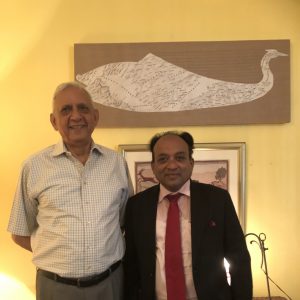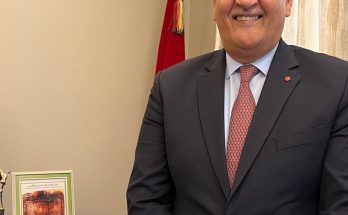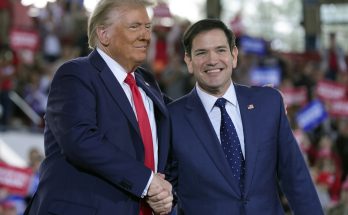Prime Minister Narendra Modi’s first foreign visit during the pandemic to Bangladesh on March 26-27 has elevated India-Bangladesh ties to a higher trajectory and cemented New Delhi’s status as an indispensable partner of Dhaka, says Dr Gowher Rizvi, International Affairs Adviser to Bangladesh Prime Minister Sheikh Hasina.
In a free-wheeling interview with Manish Chand, CEO & Editor-in-Chief, India Writes Network and India and The World magazine at his home in Dhaka during PM Modi’s visit, Dr Rizvi rejected any attempt by Bangladesh’s political-diplomatic leadership to play India against China as “outrageous” and stressed that while Bangladesh will continue to follow the vision of Bangabandhu Sheikh Mujibur Rahman, “Friendship towards all, malice towards none,” India will remain “Bangladesh’s most important ally and neighbour.” “India is central to our security and our economic prosperity and political stability. We hope India feels the same way about Bangladesh. This is not a relationship we are going to trifle with. Bangladesh sees India as an indispensable partner,” said Dr Rizvi.

In this conversation with India Writes Network, Dr Rizvi, who is a well-known author and academic besides holding the prestigious position of Sheikh Hasina’s adviser, speaks about a wide array of subjects, including the transformation of India-Bangladesh relations, special chemistry between PM Modi and Sheikh Hasina, regional and global aspirations of Bangladesh and the way ahead for Delhi-Dhaka partnership.
(Excerpts from the interview)
MC: What’s the big message coming out of the March 26-27 visit by Prime Minister Narendra Modi to Bangladesh in the context of the ongoing transformation of India-Bangladesh relations? What’s so special about this visit?
Dr. Gowher Rizvi: This has two important dimensions. First is Prime Minister Modi coming here to celebrate with us the centenary of the birth of Bangabandhu and centenaries are always very important. When it is the centenary of the Father of the Nation, it is particularly important that PM Modi has personally chosen to come to Bangladesh, to join us, to celebrate with us, to share our happiness — it means a lot.

Also, the fact that this is the first time Prime Minister Modi has stepped out of India during the pandemic in itself shows how much importance he attaches to nurturing relations with Bangladesh. There is the celebratory part of the visit – the fact that the government of India has awarded Bangabandhu Gandhi Peace Prize posthumously for the first time. This is a very special gesture.

During his visit, PM Modi personally handed over the Gandhi Peace Prize posthumously awarded to Bangabandhu to Sheikh Hasina. During his visit, he also announced the gift of 109 ambulances for Bangladesh. There is a chair being named after Bangabandhu in Delhi University. These are very significant gestures. In addition to that, even though it was a very short visit he went to Tungipara to pay homage to Bangabandhu. This is of great significance, not only because he’s the first head of government who has gone to Bangabandhu’s village but also it is a very symbolic, heart-warming gesture for the Bengalis to see the Indian Prime Minister laying a wreath in this manner.
MC: Talking about PM Modi’s relationship with Sheikh Hasina, people often talk about special chemistry between the two leaders. How much has the Modi-Hasina chemistry contributed to the current high trajectory in India-Bangladesh partnership?

Dr. Rizvi: I’ve had the privilege of knowing Sheikh Hasina for as long as I can remember. She’s an amazingly warm, informal, genuine and sincere person. I don’t say this because I happen to be her advisor. There is something very unique and very special about her. She does not believe in protocols. She cannot be restrained by protocol. She went to the airport to receive Prime Minister Modi not because she felt she had to but because she felt – my neighbour is here, I want to welcome him.
Bangladesh: Unfolding Success Story
MC: Bangladesh’s success story is an inspiration for the region in many ways. Very shortly, Bangladesh will graduate from the LDC status. Besides economic upswing, Bangladesh is also looking to raise and elevate its stature on the regional and global stage. In this context, how do you look at prospects of cooperation between India and Bangladesh in regional and global fora?
Dr Gowher Rizvi: Bangladesh, like every country in the world, wants to play a regional and global role and we are good global citizens. And one of the ways we have demonstrated our ability to be good global citizens is by our participation in the international peacekeeping force and the UN peacekeeping force. Most years, we are the largest contributor to the UN peacekeeping force.
We have again demonstrated our sense of responsibility by taking in the Rohingyas. We have demonstrated our sense of responsibility by weeding out terrorists from other places operating from Bangladesh. On the other hand, we are also very, very aware that our key priorities are economic and social growth. That is where our focus is and that’s where our regional policy is.
Given our location, we would like to be the hub of connectivity. First, our sub-region, Bhutan, India, Nepal and Bangladesh, hopefully pushing forward towards Myanmar. We want to be the hub connection in Southeast Asia. We are looking to be part of the Bangladesh-China-India-Myanmar (BCIM) so that our relationship with China and also trade can flourish. We are developing port facilities in Chittagong. We have no military purpose for these ports and we are going to open them up to all our neighbours for peaceful and trade purposes. We have opened up our Chittagong port and Mongla port. We will soon open up our Payra sea port to Bhutan and Nepal. We are building our infrastructure so that we become a hub of regional connectivity.
We also know that we are heavily dependent on power. We are energy deficit. We have gas but not enough. So far, a lot of our power projects are fire and coal-based, including 1320-megawatt power plant in Rampal, the Indo Bangladesh Electric Project. Ultimately, the solution to our energy demand will come from hydro-electric and possibly nuclear energy. Sources of hydroelectric energy are in northeast India, Arunachal Pradesh, Assam, the hilly areas, Bhutan and Nepal. We need to work together and we need to cooperate. You can develop your power projects in Northeast, but the demand for electricity is in Bangladesh. In order to take it to where the demand is, you have to go through Bangladesh. We are using every opportunity to enhance our prospects. We have a goal of becoming a developed society and a high-income nation by 2041 and all our efforts are directed towards that end.
Obviously, no country is an island. We need international support, we need a voice in various international fora and by working together with India, coordinating our voices, we both gain. In the same way, the market force is promoting and developing investment relationship between the two countries but we must go beyond that. We have to think strategically how to engineer our economy in such a way that we become much more interdependent and where we can take advantage of each other’s comparative advantage. There are many opportunities for such synergies. We have always stood by India on almost all issues and India has stood by us. And where we have voted differently in the United Nations, we understand each other’s constraints.
China Factor
MC: Bangladesh’s relations with China has seen a marked upswing in the last few years. Chinese investment in Bangladesh has gone up dramatically. Bangladesh’s growing strategic proximity to India has triggered concerns among diplomatic-strategic community in India, specially after Dhaka signed BRI. Some suspect Bangladesh of using the China card to balance India. What’s your take on this issue?
Dr Gowher Rizvi: Let me be very categorical. India is our most important ally and neighbour. India is central to our security and our economic prosperity and political stability. We hope India feels about Bangladesh in the same way. This is not a relationship we are going to trifle with. India is an indispensable partner of Bangladesh.
But like every other country, we also are interested to promote our economy and to the extent that China can contribute to our infrastructure development, we welcome Chinese involvement as they have technology, they are willing to provide suppliers credit, they are competing and winning many projects.

The idea that we will play one against the other, engage in a balancing act – it is outrageous. It is really outrageous. What is China’s interest and what is India’s interest? Both countries would like to see politically stable and prosperous Bangladesh and everything that we do is to achieve that; a hungry nation or a poor nation cannot be stable. So, we are moved by that vision of Bangabandhu, “Friendship towards all, malice towards none”. And our foreign policy is driven by finding ways of how we can create Sonar Bangla. Obviously, we are still some distance away from Sonar Bangla but I think if Bangabandhu had been alive today, he would be happy to see that our people are not only having two square meals, but they are also having a balanced diet. Nutrition standards have gone up and per capita income has gone up. We have basic universal health care. We have social safety nets. We have cent percent enrolment in primary school. Our girls are overtaking the number of boys in schools and colleges. Our overall literacy is shooting up.
While these are solid achievements, we also have concerns such as growing inequality. We are at a tipping point. If we do not quickly address that, we may fail to because while inequality happens everywhere where rapid growth takes place, we have learnt from South Korea that if rapid growth takes place and inequality becomes very large, then growth stops. So that is a lesson we also need to learn.
(The full text of the interview will be published in the forthcoming edition of India and The World magazine)
Author Profile

- Manish Chand is Founder-CEO and Editor-in-Chief of India Writes Network (www.indiawrites.org) and India and World, a pioneering magazine focused on international affairs. He is CEO/Director of TGII Media Private Limited, an India-based media, publishing, research and consultancy company.
Latest entries
 India and the WorldJune 16, 2025Amid Pakistan-Turkey nexus, Cyprus joins India against cross-border terror
India and the WorldJune 16, 2025Amid Pakistan-Turkey nexus, Cyprus joins India against cross-border terror India and the WorldMay 8, 2025Pahalgam payback: India exposes Pakistan’s lies, misuse of religious sites for training terrorists
India and the WorldMay 8, 2025Pahalgam payback: India exposes Pakistan’s lies, misuse of religious sites for training terrorists India and the WorldMay 3, 2025IMEEC provides a democratic alternative to BRI: Italy’s former foreign minister (Interview)
India and the WorldMay 3, 2025IMEEC provides a democratic alternative to BRI: Italy’s former foreign minister (Interview) India and the WorldApril 21, 20253T Template for India-US Mega Partnership
India and the WorldApril 21, 20253T Template for India-US Mega Partnership








